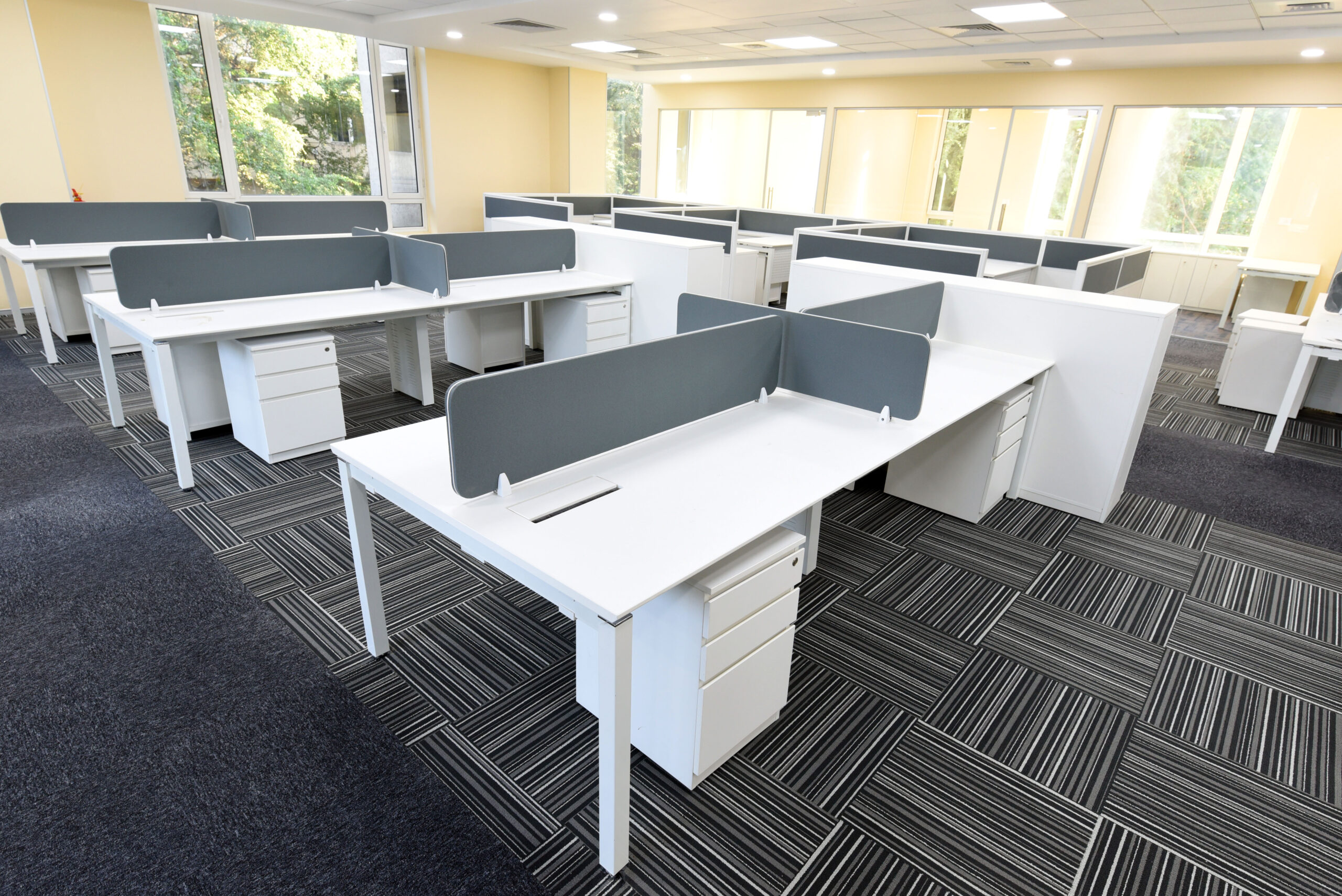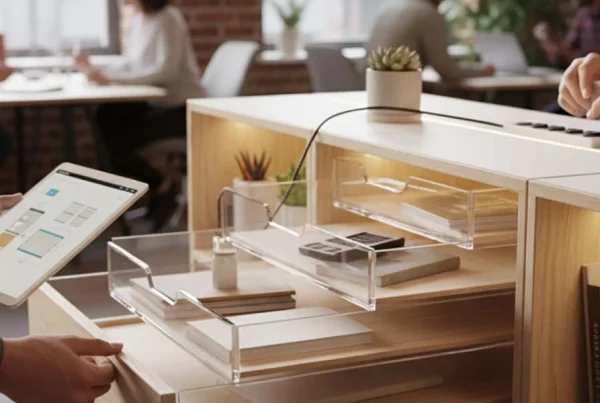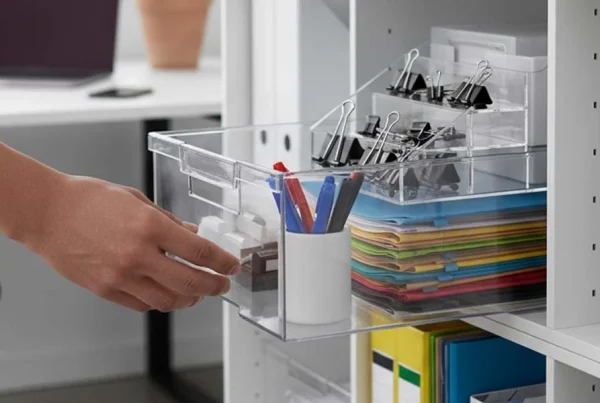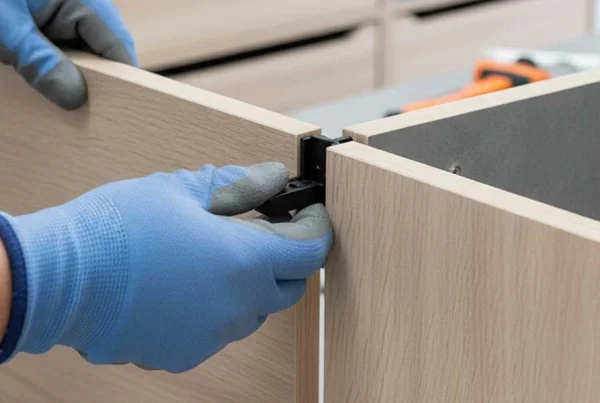Your office needs to respond to change without slowing down your workflow. Whether you’re expanding your team, adjusting to hybrid schedules, or managing limited square footage, flexibility is critical. Modular furniture gives you the control to adapt without committing to a full renovation. Instead of building around fixed layouts, you can work with pieces that shift as your needs evolve. A well-designed modular system helps you use space more effectively while keeping your environment professional and organised.
In this blog, we will explore what modular furniture is and share 5 smart modular furniture solutions.
What Is Modular Furniture?
Modular furniture lets you reconfigure your space as needed. Each piece is built to connect, rearrange, or stand alone. You can scale up, shift configurations, or store components without starting from scratch. Such office design trends let you respond to the way your team actually works, not the way a static layout expects them to.
A thoughtful approach to office furniture design considers both functionality and flow. How desks, seating, and meeting spaces interact impacts not just how the office looks but how it works.
You don’t need to keep replacing furniture when your office changes. Modular systems are built to grow with you. They help maintain visual consistency, reduce waste, and save time. Instead of locking yourself into one setup, you stay flexible with the right tools in place.
An adaptable furniture modular office setup ensures you can scale your space efficiently as team size or tasks evolve. It’s a long-term investment that minimises disruptions and maximises usability.
5 Smart Modular Furniture Solutions
1. Modular Workstations
What it is:
Modular workstations are desk systems that you can expand, separate, or rearrange. They may include shared frames, connection points, and built-in cable management.
Why it works for you:
You need workstations that match your headcount and task flow. Modular desks allow you to group teams together or space them out, depending on the requirement. If your team grows, you can connect new sections without disrupting your layout. When the office is quiet, you can create more open space for focus.
You also save space by sharing power modules and support legs across desks. Much conference room furniture offers privacy panels, height adjustment, and under-desk accessories. That means fewer loose parts, fewer wires, and less visual clutter. It gives more function without losing flexibility.
Smart modular furniture options offer built-in power and tech integrations that make adapting your setup fast and intuitive.
2. Mobile Partition Walls
What it is:
Mobile partitions are freestanding or wheeled panels that divide space without permanent walls. Some include acoustic features or writable surfaces.
Why it works for you:
You need to shift between open and closed zones without changing your floor plan. These partitions let you build out private areas, quick meeting spaces, or sound-reducing zones on the fly. When you’re done, they move out of the way or stack neatly against a wall.
You can use them to block distractions or give teams the privacy they need to focus. Panels with whiteboard surfaces offer added value during brainstorming sessions. If you share office space or rotate teams often, this setup gives you quick and hassle-free control over the room.
Great collaborative workspace design includes mobile dividers that promote both teamwork and individual focus, depending on what the moment requires.
Looking to create a workspace that adapts to you?
Whether you’re scaling your team or rethinking your layout, our modular office solutions are designed for flexibility and style.
3. Stackable and Nesting Seating
What it is:
This includes chairs and stools that you can stack vertically or nest to save space. Some versions have casters or flip-up seats.
Why it works for you:
You don’t always know how many people will be in the room. Stackable and nesting seating gives you flexibility without permanent bulk. When you’re hosting a training, workshop, or team meeting, you can roll out extra chairs. When space is tight, you can use storage units for office supplies with minimal effort.
Nesting models work well for multi-use rooms. You can clear the floor in minutes, as their compact footprint keeps storage areas clean. You stay ready for changes without sacrificing comfort or mobility. A reliable office furniture manufacturer can offer stackable seating that’s durable, ergonomic, and easy to store.
4. Modular Lounge Systems
What it is:
These are lounge pieces like sofas, ottomans, and benches that connect in multiple ways. Some include built-in tables or charging ports.
Why it works for you:
You need space for informal work without creating clutter. Modular lounge seating gives you a comfortable layout that adjusts to the way people gather. You can line seats along a wall for quiet focus in the morning, then shift them into a group format when teams need to communicate.
You can use the same pieces in break areas, shared lounges, or waiting rooms. They hold up under frequent use and look consistent across the office. Some systems let you add tables or power outlets so people can plug in and keep working. It’s easy to create multipurpose zones that still look polished. Workstation desks for offices can be combined with nearby lounge areas to support both solo and collaborative work.
5. Adjustable Height Desks with Modular Components
What it is:
These desks move between sitting and standing modes. Many offer optional add-ons, including privacy panels, storage trays, and clip-on shelves.
Why it works for you:
Your team works differently, as some people may need quiet focus and others want quick collaboration. Adjustable height desks let each person control their setup. With modular features, you can keep it simple or add functions as needed.
If you’re shifting to a more open office layout idea, you can attach screens for privacy or sound control. Add monitor arms, trays, or shelves to support tools without taking up more space. These desks offer a balance of movement and structure. You support wellness without giving up flexibility. Pairing height-adjustable desks with smart office partition design gives employees control over their environment without isolating them completely.
Conclusion
Your workspace doesn’t need to stay locked in place. Modular furniture gives you the tools to adapt without extra effort or expense. With the right setup, you can respond to growth, team shifts, and day-to-day changes using systems that are made to move with you.
You don’t have to over-design your office to keep it functional. Instead, you build a layout that adjusts when it needs to. Modular workstations, mobile dividers, stackable chairs, lounge seating, and sit-stand desks each offer office space utilisation. When used together, they give you a scalable system that stays aligned with how your team works.
Are you ready to make your office space more flexible? Contact us to explore modular furniture solutions that fit your needs.
Ready to transform your office into a flexible, future-ready workspace?
Our modular furniture solutions are tailored to your space, style, and workflow needs. Let’s help you design a setup that grows with your business.
Vishnu Sharma
I am the co-founder and CEO of Vlite Furnitech, creating modular office solutions since 2009. With a background in Chemistry and Marketing, and experience as Regional Head at Featherlite, I help design ergonomic, adaptable, and sustainable workspaces. Alongside a team of 120+, we serve corporates like JCB, Just Dial, KFC, and educational institutions. Let’s connect to reimagine innovative, eco-friendly office environments.





